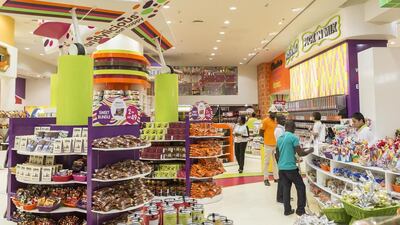When it comes to the quality and blending of international and regional flavours for confectionery treats, globalisation is increasingly driving the education of local minds and palates.
DUBAI // A greater exposure to a variety of international delicacies has led to a shift in the kind of confectionery many residents prefer.
Those with a sweet tooth are now just as likely to bite into European chocolates as they are Arabic classics such as baklava, experts said.
“What’s popular has certainly changed over the past 10 years or so as people have become more health conscious and have become exposed to higher-quality chocolate from Europe,” said Tina Memic, general manager for retail operations at Bateel, a gourmet date producer.
“People generally are willing to pay a little more if they know they are getting better quality and have it on special occasions.”
Miss Memic said that European chocolates used pure cocoa butter rather than the vegetable oil found in many commercial brands. This improved quality.
“There is always a high demand for Arabic sweets, especially baklava, but people opt for ones that are less oily,” she said.
“The long tradition of these kinds of sweets in this country and region generally will always mean they will remain popular.
“We also find many visitors and expats prefer these kinds of sweets.”
The UAE and Saudi Arabia have the largest share of the GCC’s annual spend on chocolate.
The UAE spent US$38 (Dh140) per capita on chocolate a year, according to Euromonitor.
Estimates in 2014 projected that the UAE confectionery market would hit $292.4 million by next year, up from $225.7m in 2012.
Sneha Bhatia, founder of Sugaholic Bakeshop in Dubai, believes many in the UAE have developed a more diverse palette in recent years.
“They are always looking to experiment with new flavours,” she said.
“Whether it is a mix of local and French ingredients or just a different way of eating the same dessert, people here are always on the lookout for something out of the box.”
The most popular products were traditional cakes – cupcakes are still the favourite – with demand for macaroons growing in recent years, Ms Bhatia said.
“Paleo and gluten-free desserts have also gained a small share of the market recently,” she said, adding that Arab and non-Arab customers’ preferences were generally similar.
“The only difference is that our Arab clients like bigger portions in comparison with the expat crowd and prefer cakes that tend to be more on the sweet side.”
Rosantina Saraswati, head of confectionery retail at Al Abbar Enterprises, which owns the Candylicious shop in Dubai Mall, expected demand to rise towards the end of Ramadan.
“People prefer to stay at home with their families during the first couple of weeks,” she said.
“The trend picks up entering the second half of Ramadan, because it is the time people start preparing for Eid, buying Eid gifts, and getting ready for the big celebrations.”
Among the favourite sweet treats during the holy month this year were Belgian nougat bars, handmade cake bars from Ireland, organic thin biscuits from Spain and Hershey’s Snackster, she said.
“During Ramadan customers are looking for sweet items to enjoy together during iftar gatherings as well as gifting to families, neighbours and colleagues,” Ms Saraswati said.
Brit Becky Williams enjoys the local Arabic delicacies but continues to take pleasure in the familiar comforts of home.
“I’ve always been a fan of Cadbury chocolates and thankfully they are available here so I don’t feel as though I’m missing out,” said the 27-year-old.
“I have tried baklava and although it was really nice, I found it a little too sweet for my taste.”
Emirati Ahmed Al Farooqi, 21, has expanded his list of favourites since travelling in Europe in recent years.
“I still like the traditional stuff but I developed a taste for dark chocolate during my time in France,” he said.
“I used to find it bitter but once you get used to it it’s really nice.”
nhanif@thenational.ae

